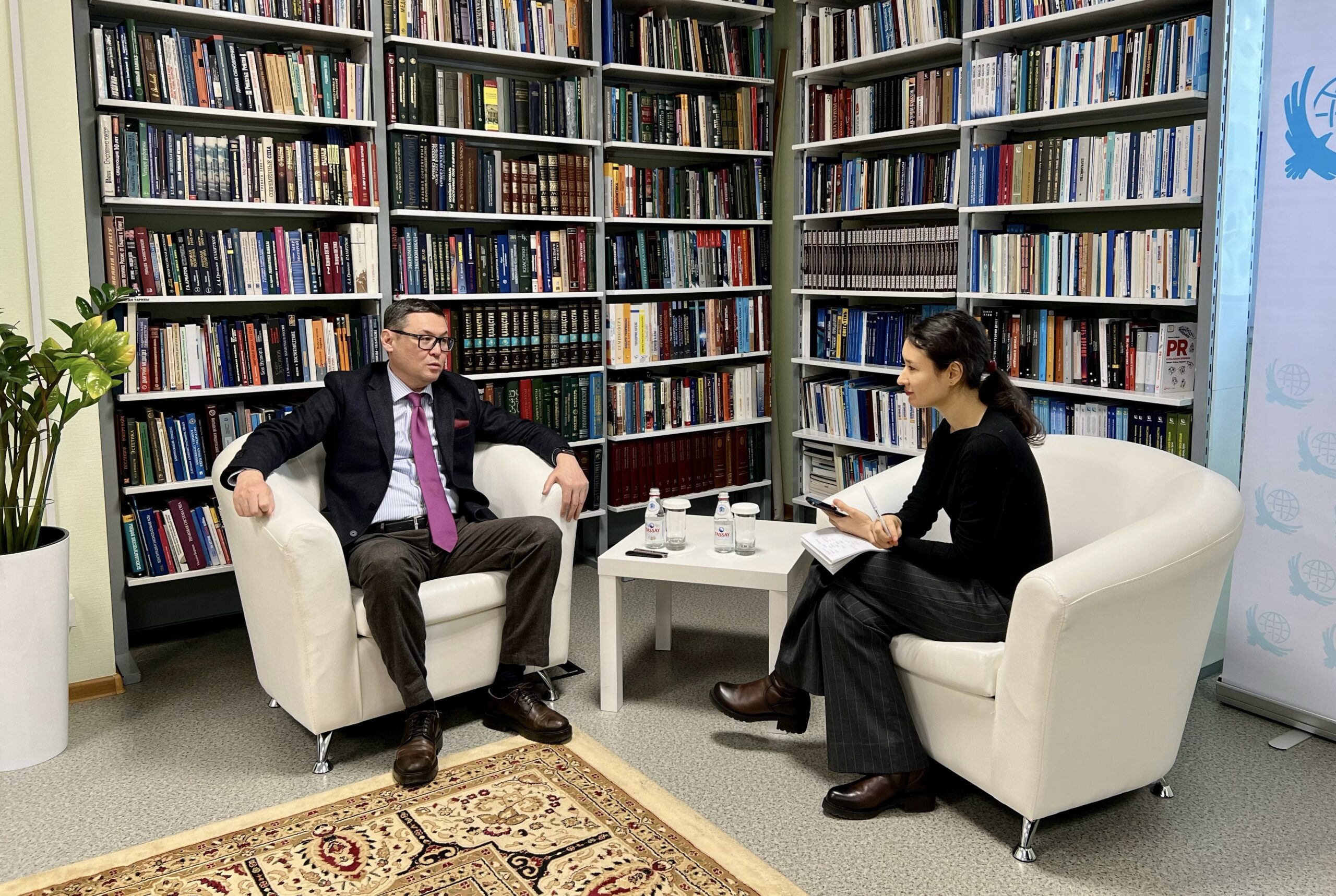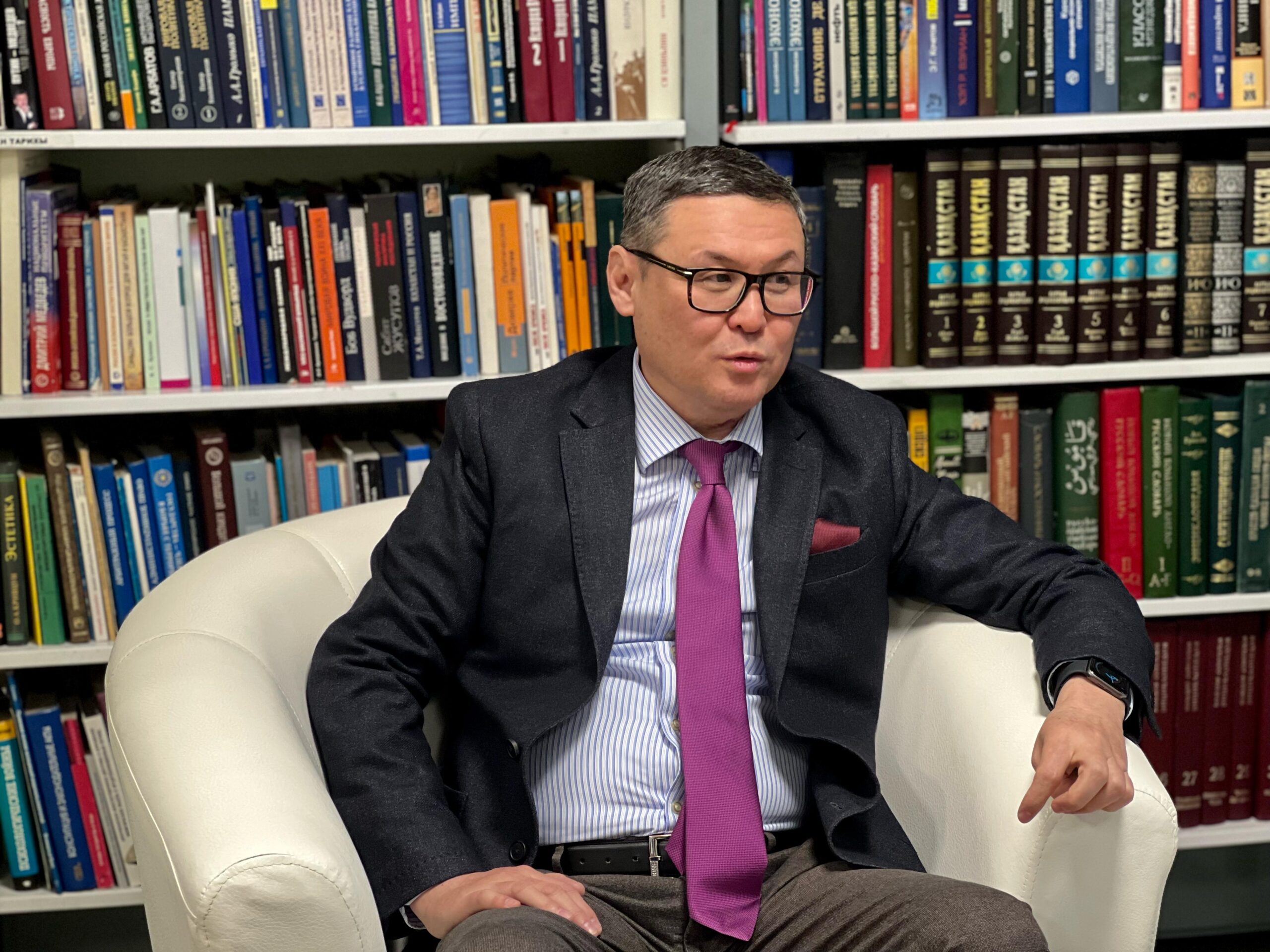ASTANA – Doubling Kazakhstan’s economy to $450 billion by 2029 is an ambitious task that requires moving to a more complex economy, said Yerkin Tukumov, director of the Kazakhstan Institute for Strategic Studies (KazISS) in an interview with the Astana Times.

Director of the Kazakhstan Institute for Strategic Studies Yerkin Tukumov talked with the Astana Times correspondent Aibarshyn Akhmetkali. Photo credit: Aida Dosbergenova/The Astana Times.
Besides economic development, Tukumov also talked about the dynamics of regional cooperation among Central Asian states and Kazakhstan’s position in international organizations.
A path towards doubling Kazakhstan’s economy
Kazakhstan is on course to double the national economy to $450 billion by 2029, backed by the tasks set by President Kassym-Jomart Tokayev during his recent address at the extended government meeting on Feb 7. The meeting followed the reshuffle of key ministerial posts, which should facilitate the effective implementation of 10 priority tasks for Kazakhstan’s economic development.
“This is a very ambitious goal,” said Tukumov. “Whether it is achievable or not depends on whether we can move from a raw material model to a more complex model [of economy]. Because the raw material model has its limitations, it gives only 2-2.5% annual growth. That’s not enough. In order to achieve a big target like that, you need somewhere around 5% growth.”
According to him, it will be the non-oil sectors that will drive the growth in the economy. As Kazakhstan continues to build a diversified knowledge-driven economy, forging industrial initiatives will be a key pillar of this strategy.
“So far, it is a matter of developing industry, manufacturing, the matter of adding value to our simple products, including exports. If, for many years, our primary exports included the products of the first stage of processing, i.e. alloys and mineral resources, then the complex economy means a transition to a higher level of processing. This means the production of petrochemicals, for example,” said Tukumov.
This could be applied in all spheres from oil and gas to agriculture. The size of the task ahead is as daunting as it could be ultimately rewarding.
“If we move to a more sophisticated economy, we can achieve much more than $450 billion. In this regard, the President has already set clear objectives for the manufacturing industry, for petrochemicals, for tax legislation, for attracting investment and other spheres. In other words, the task has been set, and we need to fulfill it,” said Tukumov.
What can hinder economic growth?
There are factors that need to be considered to reach that target, energy security and human capital being the most important among them.

“The fate of the region should be determined in the region itself,” said Tukumov in the interview. Photo credit: Aida Dosbergenova/The Astana Times.
“Energy is a key issue. If we are going to develop industry, cities, urbanization and so on, where will we get the energy from? We have to think about added power. Since we have already announced the transition to carbon neutrality by 2060, we have to think about other energy sources: not only fossils but solar, wind and other types of clean energies. And thanks to technology, the cost of production from the types of energy I mentioned is constantly falling,” said Tukumov.
For example, solar energy cost per unit has come down by around 80% and wind energy by around 40% and it keeps decreasing, according to Tukumov.
There are limitless opportunities to advance renewable energy in Kazakhstan, he said.
“We have natural opportunities to generate solar energy as well. In Astana, we have sunshine almost all year round. Practically, the entire Kazakhstan’s landscape is rich in this, which allows us to develop clean energy,” said Tukumov.
Kazakhstan should also seek to overcome the technical obstacles of economic growth through investing in highly skilled human capital.
“The investment in human capital is another important theme. Yes, we can create the most favorable investment conditions but then who will do all this? Where are the blue-collar, white-collar people who will do all this?” Tukumov said, providing as an example companies such as Ikea that require a skilled workforce and resources when opening their branch.
“I believe that we are living at a critical time and the next few years will be crucial in terms of what trajectory we will follow. The President has outlined this trajectory, but we need to fulfill it,” said Tukumov.
Kazakhstan’s chairmanship in international organizations
In 2024, Kazakhstan will chair six international organizations. They are the Shanghai Cooperation Organisation (SCO), the Collective Security Treaty Organization (CSTO), the Conference on Interaction and Confidence Building Measures in Asia (CICA), the Organization of Turkic States, the International Fund for Saving the Aral Sea (IFAS) and the Islamic Food Security Organization.
Kazakhstan has initiated many of those organizations, such as the CICA and the IFAS.
According to Tukumov, it is a remarkable accomplishment for Kazakhstan that comes with a great responsibility to lead such international, multi-stakeholder initiatives.
“Indeed, this is an unprecedented level of activity. Moreover, it is a great responsibility to chair such organizations. Certainly, we will do everything to help these organizations continue to develop and prosper and fulfill their mission. I believe that the development of these organizations is in the interests of Kazakhstan. Otherwise, we would not be members, much less founders,” he said.
Chairing international organizations entails leadership and collaboration with all interested stakeholders, both at a national and international level. It also means creating and implementing critical public policies and reforms that serve the interests of Kazakhstan along with other member states.
“You should understand that foreign policy is always a continuation of domestic policy. And in this regard, Kazakhstan’s foreign policy, precisely if we take a cross-section of these organizations, is first and foremost a consideration of our national interests, our development, security, and our sovereignty. Therefore, of course, we will take the opportunity to promote our interests and agenda, taking into account the opinion of other members of the organization,” said Tukumov.
The chairmanship in the SCO, one of the largest organizations in Asia and with dynamic markets home to almost 3.5 billion people, will serve as a resource for Kazakhstan to access the benefits offered by the organization.
Central Asian coordination in water management
The issues related to water management, transport, trade and cultural and humanitarian integration should be addressed in conjunction with all Central Asian countries.
“The fate of the region should be determined in the region itself,” said Tukumov.
“Astana, Dushanbe, Tashkent, Bishkek and Ashgabat should address the issues of the development of five countries. We realize that no matter how self-sufficient we are individually, it is in our interests to unite all these efforts. Why? Because we have common problems,” he added.
Few things are more important to Central Asian countries than access to freshwater resources. The imbalance between upstream countries’ water use and downstream high demand poses a serious threat to water security and the big hope is that better transborder water coordination can prevent a serious crisis.
“Water flows are formed in Tajikistan and Kyrgyzstan, and downstream countries often suffer because of uncoordinated water policy. I would say that upstream and downstream countries must coordinate water policy,” said Tukumov.
With the threat of climate change adding to the region’s water scarcity problem, there are big challenges where regional cooperation would play a crucial role in delivering effective solutions.
Climate change and the rising temperature in the region should prompt the countries to establish cooperation institutions to guard against water shortages, and the IFAS could be one of those.
“This is a key organization for us from the perspective that the climatic conditions will only become worse. We see this already in Astana: an unprecedentedly warm January, snow is melting. This is a sign that the warming in Central Asia is progressing more rapidly than in other regions. Despite contributing the least to the overall pollution of the world climate space, we suffer the most harmful effects. It was already projected a 1.5% average increase in temperature in our region,” said Tukumov.
“For us, saving the Aral Sea is an existential issue. Our Small Aral is already recovering, not to the levels of the 1960s, but at least it is not drying up at the previous rate. Plus, fishing has already been restored there, and the infrastructure around those coastal villages is being restored,” he said.
Internal trade within the Central Asian countries also increased, reaching $11 billion and it is projected to grow up to $15 billion by 2030, according to Tukumov.
“Previously, we used to trade more with the outside world. We still proportionally continue trading with the European Union, China, Russia and other countries that are important to Kazakhstan. But inside the region, we traded much less. Now, this proportion is gradually increasing, which is an indicator of the interconnectedness of the economy. That is, we supply certain goods and, for example, Uzbekistan supplies us. And it is mutually beneficial,” said Tukumov.
Removing barriers in Central Asia
To facilitate trade within the region, it is essential to eliminate unnecessary barriers and improve logistic connectivity.
“I’ll give you a simple example. The road from Almaty to Bishkek now takes almost 3-4 hours, taking into account the border crossing time. This is not right. I believe that if we are going for barrier-free cooperation, we should take the example of the European Union and the Schengen zone,” said Tukumov.
Optimizing routes and establishing direct air flights between all Central Asian capitals will also add to more connectedness.
“We say a lot that we are close nations. Let us turn this into reality. The position of our President is very clear in this regard. We must cooperate in all areas in the region. There is no such thing as refusing or not doing something. We are ready for maximum cooperation,” he added.
C5+1 dialogues
Regional cooperation is also important when it comes to the broader international agenda. The highest-level government meetings within the C5+1 format have been made with around 17 countries, including China, Japan, India, Russia, South Korea, and the United States.
“We are already acting as a unified region with unified positions. We are all interested in our economic modernization. We are all interested in attracting investment. We are all interested in building more sophisticated economies,” said Tukumov.
“We talk to these partners, and they see and listen better because it is one thing when Kazakhstan speaks on its own, and it is another when we speak from the region. So I think that this is another indicator that well characterizes the positive trends within our cooperation in the region,” he added.

